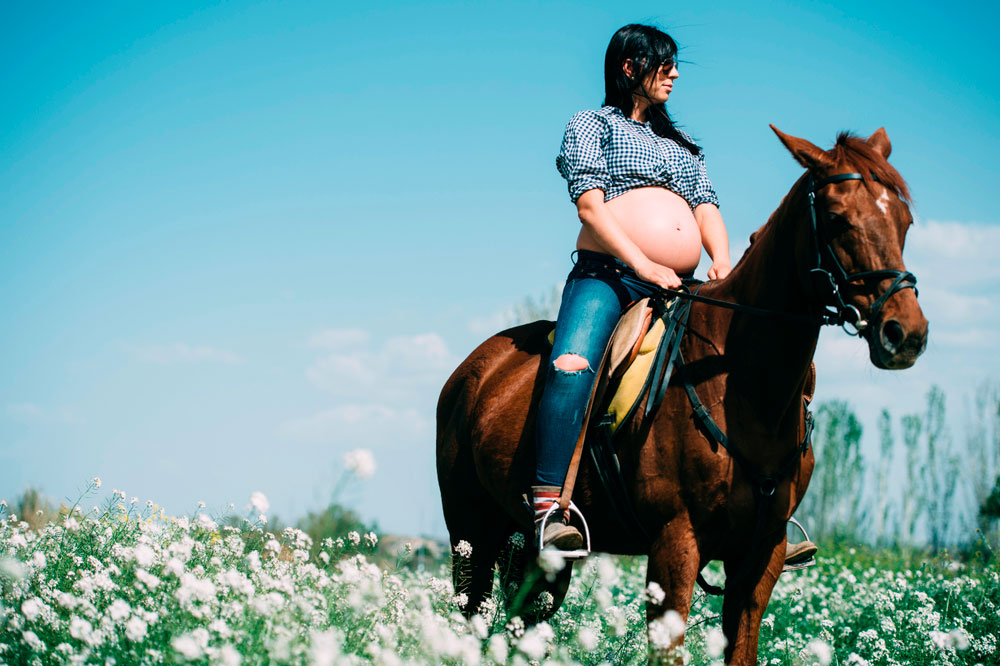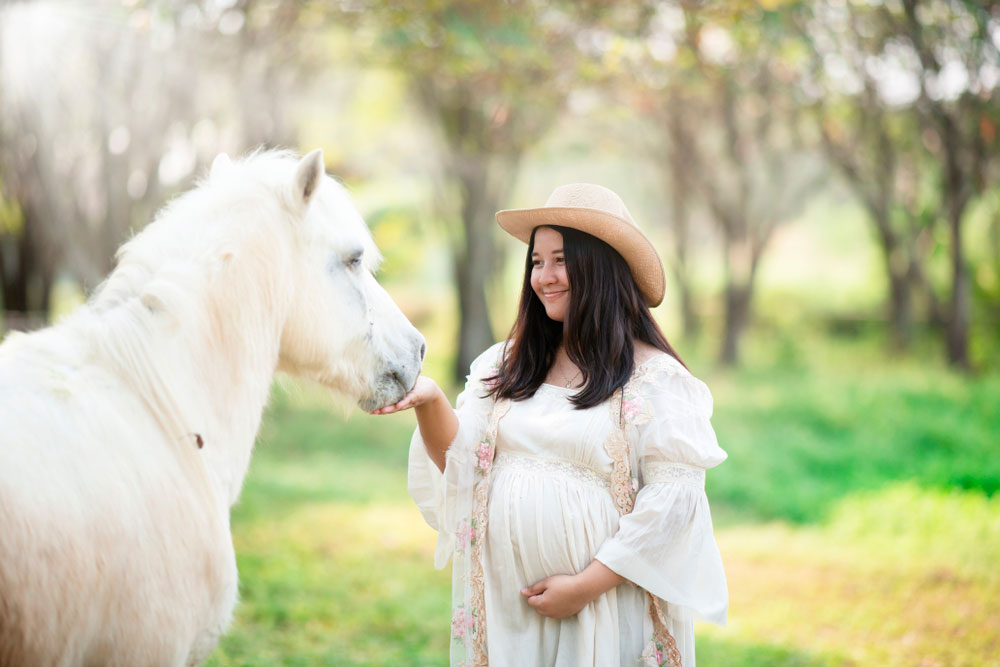Horseback riding is a great way to get back in shape, but can you ride a horse while pregnant? The answer is yes, with some precautions. You’ll need to take your doctor’s advice into consideration when horseback riding during pregnancy. This article reveals useful tips to follow when riding while pregnant. Check the warning signs and precautions when you shouldn’t hop on a horse.
When Horseback Riding and Pregnancy Is Ok
If you feel good, you can go for a ride. However, there are precautions to take into consideration when horseback riding while pregnant. So that it doesn’t endanger the baby’s life.
You should always listen to your doctor when horseback riding during pregnancy. Your body will change throughout this period since the uterus rises up in front of your stomach. You’ll also experience hormonal changes. This could make you more prone to falls or injuries related to horseback riding while pregnant.
These conditions also affect blood circulation. It means you might feel faint when horseback riding during the early stages of pregnancy. Or experience dizziness later on in your second trimester.
But if you feel your health is in no danger, horseback riding during pregnancy can be a fun and low-intensity workout.
Benefits of Horseback Riding While Pregnant
Horseback riding while pregnant can be even advantageous. If you’re an experienced equestrian, there should be no issues. Riding a horse brings lots of positive emotions. And mental health is also essential when pregnant.
If horse riding is a part of your life and it’s a great way to unwind, you can try it when pregnant. Keeping the bond with your horse can make you feel relieved. Such a state is important when carrying a baby.
Keep in mind that your body is changing during pregnancy. Keep reading to find out when it’s better to get back to the horse saddle.

Pregnancy and Horseback Riding: The First Trimester
During the first trimester, horseback riding is not recommended. The risk of miscarriage increases when a woman rides or drives on horseback in the first trimester.
On the other hand, your belly is not big enough to ride comfortably. The bony pelvic girdle protects your baby inside. This brings extra protection when carrying a baby.
The main precaution is the risk of falling off the horse. Thus, if you decide to ride a horse, get solid protection. Always wear a riding helmet, gloves, and boots. This is a rule of thumb whether you’re pregnant or not.

Pregnancy and Horseback Riding: The Second Trimester
During the second trimester, you can ride without any serious risks for your baby’s health. It will improve blood circulation and help to ease morning sickness symptoms (nausea and vomiting). If horseback riding was part of your life before pregnancy, it may be helpful during this period.
Just keep an eye out for signs that should stop horseback riding immediately. These include dizziness at every movement, pain in joints or abdomen area. These are all danger signals that mean you shouldn’t continue horseback riding today.
Consider avoiding trotting since it could affect your balance. Galloping is also discouraged after the first trimester. Horse movement can impact your blood flow and put too much pressure on the uterus, cervix, or placenta.

Pregnancy and Horseback Riding: The Third Trimester
During the third trimester, horseback riding is generally safe. If you ride a horse, make sure to take your time. Don’t try any new tricks or activities that could be strenuous for the horse or yourself (such as jumping). As always, listen to your body’s cues. If it says “stop” after a certain activity – do so!
During horseback riding sessions while pregnant, avoid going through water deep enough where you cannot touch the bottom with both feet. Keep stirrups short enough so they do not press on the abdomen when in full contact with them. Allow legs to hang freely.
Wear shoes with grips during all horseback riding sessions. Even though this may seem counterintuitive given slippery conditions. In addition, maintain proper posture by holding onto reins tightly but gently and keeping your core engaged.
Carry horseback riding equipment in a safe and secure manner so it does not become loose during horseback riding sessions or fall off the horse. Finally, always communicate with another rider when you are pregnant. This will help to avoid injuries that could occur due to inexperience on both parts.

Warning Signs to Stop Horse Riding
Here’s a list of warning signs to stop horseback riding while pregnant.
- You are experiencing dizziness when horseback riding. If you feel like your body is spinning or if the horse seems to be moving in circles and not going forward then get off immediately.
- You are experiencing contractions that occur while horseback riding. Sometimes these can be hard to notice at first. Pay attention to any signs of pain during horseback ride sessions. These are cramping on either side of the stomach area or a tightening sensation around the belly button area.
- Fainting spells happen frequently after completing horseback riding sessions. With no other explanation related to pregnancy complications such as dehydration or low blood sugar levels appearing afterward. This means it’s time to call an ambulance because passing out could lead to serious injury if you fall down.
- Abdominal pain is another reason to get off the horse. This is because horseback riding can cause the abdominal muscles to tighten around your baby. Cramps are a sign that this has happened again in horseback riding for pregnant women.
- In case of vaginal bleeding, stop horseback riding immediately and reach the hospital. You risk losing your baby if bleeding occurs after horseback riding for pregnant women and no other explanation.
- If you feel the fetal movement is reduced, horseback riding for pregnant women could lead to a miscarriage.
Choose a horse wisely if you want to ride when pregnant. If the horse is not well trained don’t even mount it. If you’re not in a mood, it’s not a good time for riding. Because the horse will feel your discomfort immediately. This can cause injury to both you and your baby if belly contact happens too often while horseback riding.

Healthy Pregnancy: Horseback Riding Tips
If horseback riding has been a regular part of your life before getting pregnant, it shouldn’t be a problem to have a ride. To reduce risks to baby’s health as well as that for yourself:
- avoid galloping;
- don’t ride when feeling sick (nauseous or vomiting);
- listen to horse movements – if you feel dizzy at every step stop horseback riding immediately;
- increase breaks between rides and shortens them gradually over time;
- include more warm up/cool down exercises in each session.
Most women can resume horseback riding after pregnancy without any problems. But those who had complications should check with their doctors first before getting back in the saddle. Women at high risk for preterm labor should avoid horseback riding. Because this could be a trigger that causes them to deliver earlier than expected.
If you have some concerns about horse activities while pregnant, your doctor will probably advise against exercising on the horse too. But go ahead if they don’t mind. Just keep the baby safe by avoiding galloping and taking a calm pace.
Horseback Riding and Pregnancy Explained
Pregnancy is not an excuse to abandon your horse. But it’s important to listen closely to what your body tells you while horseback riding while pregnant. This way, no risks will be taken and you’ll have more fun than ever before. Always remember safety first. This article will help you prepare for your riding journey with no stress.
